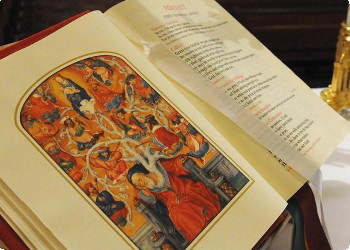Your faith has saved you; go in peace
20 SEPTEMBER (Lk 7,36-50)
Washing the feet was a sign of very great humility. Usually the servant was the one who did this to his master. We find traces of this custom in the Old Testament.
On hearing that Nabal was dead, David said: “Blessed be the Lord, who has requited the insult I received at the hand of Nabal, and who restrained his servant from doing evil, but has punished Nabal for his own evil deeds.” David then sent a proposal of marriage to Abigail. When David’s servants came to Abigail in Carmel, they said to her, “David has sent us to you that he may take you as his wife.” Rising and bowing to the ground, she answered, “Your handmaid would become a slave to wash the feet of my lord’s servants.” (1Sam 25,36-41).
One of the rules that St. Paul gives so that a woman may be entered in the catalogue of widows is right this: having washed the saints’ feet.
Honor widows who are truly widows. But if a widow has children or grandchildren, let these first learn to perform their religious duty to their own family and to make recompense to their parents, for this is pleasing to God. The real widow, who is all alone, has set her hope on God and continues in supplications and prayers night and day. But the one who is self-indulgent is dead while she lives. Command this, so that they may be irreproachable. And whoever does not provide for relatives and especially family members has denied the faith and is worse than an unbeliever. Let a widow be enrolled if she is not less than sixty years old, married only once, with a reputation for good works, namely, that she has raised children, practiced hospitality, washed the feet of the holy ones, helped those in distress, involved herself in every good work. But exclude younger widows, for when their sensuality estranges them from Christ, they want to marry and will incur condemnation for breaking their first pledge. And furthermore, they learn to be idlers, going about from house to house, and not only idlers but gossips and busybodies as well, talking about things that ought not to be mentioned. So I would like younger widows to marry, have children, and manage a home, so as to give the adversary no pretext for maligning us. For some have already turned away to follow Satan. (1Tm 5,3-15).
The woman who washes Jesus’ feet with her tears and dries them with her hair is professed humble servant of Jesus, his slave forever. She sees Jesus as her Lord, her only Lord, but sees him in the height of his holiness. By now, she wants to belong to his holiness. She declares herself a slave of his holiness.
A Pharisee invited him to dine with him, and he entered the Pharisee’s house and reclined at table. Now there was a sinful woman in the city who learned that he was at table in the house of the Pharisee. Bringing an alabaster flask of ointment, she stood behind him at his feet weeping and began to bathe his feet with her tears. Then she wiped them with her hair, kissed them, and anointed them with the ointment. When the Pharisee who had invited him saw this he said to himself, “If this man were a prophet, he would know who and what sort of woman this is who is touching him, that she is a sinner.” Jesus said to him in reply, “Simon, I have something to say to you.” “Tell me, teacher,” he said. “Two people were in debt to a certain creditor; one owed five hundred days’ wages and the other owed fifty. Since they were unable to repay the debt, he forgave it for both. Which of them will love him more?” Simon said in reply, “The one, I suppose, whose larger debt was forgiven.” He said to him, “You have judged rightly.” Then he turned to the woman and said to Simon, “Do you see this woman? When I entered your house, you did not give me water for my feet, but she has bathed them with her tears and wiped them with her hair. You did not give me a kiss, but she has not ceased kissing my feet since the time I entered. You did not anoint my head with oil, but she anointed my feet with ointment. So I tell you, her many sins have been forgiven; hence, she has shown great love. But the one to whom little is forgiven, loves little.” He said to her, “Your sins are forgiven.” The others at table said to themselves, “Who is this who even forgives sins?” But he said to the woman, “Your faith has saved you; go in peace.”
Jesus knows the woman’s repentance, knows her desire to be cleansed of sin and the ardent desire for holiness and he forgives her. The Pharisee does not know the heart of the woman and he judges her, by condemning Jesus the Lord of great ignorance.
Virgin Mary, Mother of Redemption, Angels, and Saints teach us the truth of the heart.





